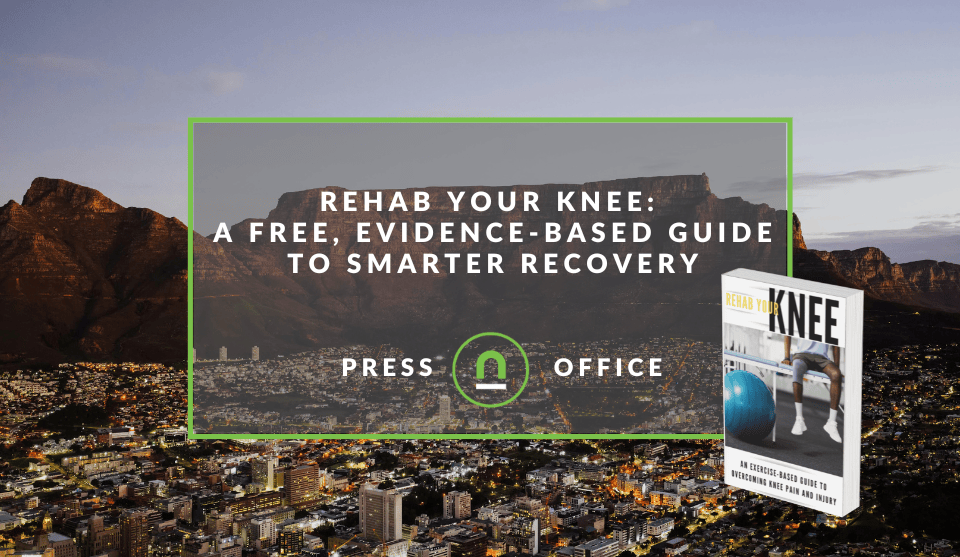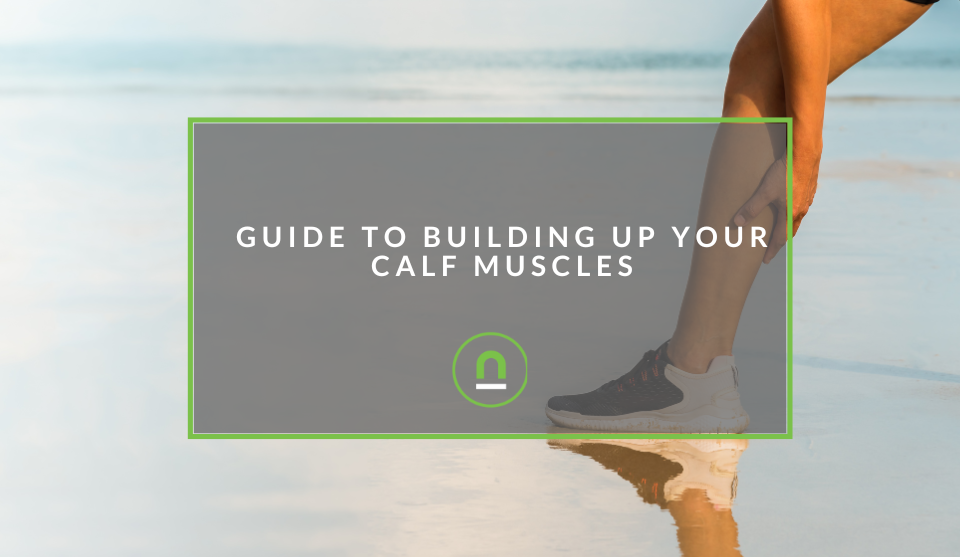Recent posts

Money Talks
A Guide To Mobile Trading Apps for South Africans
19 February 2026

Press Releases
Rehab Your Knee: A Free, Evidence-Based Guide to Smarter Recovery
12 February 2026

Money Talks
XRP vs. Stablecoins: Which Is Better for Cross-Border Payments in 2026?
28 January 2026

Press Releases
Sleep Expert Cautioning Against TikTok’s ‘Mouth Taping’ Trend
28 January 2026
Popular posts
Extravaganza
Trending Music Hashtags To Get Your Posts Noticed
24 August 2018
Geek Chic
How To Fix iPhone/iPad Only Charging In Certain Positions
05 July 2020
Extravaganza
Trending Wedding Hashtags To Get Your Posts Noticed
18 September 2018
Money Talks
How To Find Coupons & Vouchers Online In South Africa
28 March 2019
A Guide To Building Up Your Calf Muscles
23 August 2024 | 0 comments | Posted by Che Kohler in Athletes
When it comes to sculpting strong, defined calves, many people overlook their lower legs in favour of more visible muscle groups like the chest or biceps.
It's no surprise that the Skip Leg Day meme has been a popular reshare on social media, not only for the lols, but because it's true. Sadly, you can be as swole as you like up top; if you don't have the legs to match, be prepared to be called Johnny Bravo for the rest of your life.
And I mean the rest of your life.
Once people have a joke about your appearance, very few tend to let it go; it's just how humans operate.
Having jacked calves not only rounds out your body but actually serves a purpose. Having strong calves is not only important for aesthetics but also crucial for overall leg strength and stability.
Whether you're a seasoned athlete or just starting out, this comprehensive guide will walk you through everything you need to know to build up your calf muscles effectively.
Anatomy of the Calves
Understanding the muscles involved is key to targeting them effectively. The calf muscles primarily consist of:
- Gastrocnemius: The larger, more prominent muscle on the back of your lower leg. It has two heads (medial and lateral) and is responsible for the bulk of the calf's appearance.
- Soleus: Located beneath the gastrocnemius, this muscle helps with stabilising the ankle and contributes to the overall size of the calf.
- Plantaris: A small muscle that assists with plantarflexion (pointing the toes downward). It's less significant but still plays a role in calf function.
Note that everyone is different; there is such a thing as height and muscle length, and this will affect how your calves will end up looking. Sure, you can grow them to an extent, but if you're trying to get those sexy calves you see in the magazines, I would implore you to ring in those fantasies; it's just not going to happen for everyone.
I, for one, have huge calves because I am a man, a short king at that, and I played a lot of football growing up, so naturally, I did a lot of running, and yeah, it helped set a base that others might not have, but not to fear you can catch up in muscle growth.
Key Exercises for Calf Development
To effectively build your calf muscles, you'll need to focus on exercises that target both the gastrocnemius and the soleus. Here's a detailed look at some of the most effective exercises:
1. Standing Calf Raises
Target Muscle: Gastrocnemius
How To:
- Stand upright with your feet shoulder-width apart.
- Place your toes on the edge of a step or platform, allowing your heels to hang off.
- Push through the balls of your feet and raise your heels as high as possible.
- Slowly lower your heels back below the step level for a full stretch.
Variations:
- Single-Leg Calf Raises: Perform the exercise on one leg to increase intensity and address muscle imbalances.
- Weighted Calf Raises: Hold dumbbells or a barbell to add resistance.
2. Seated Calf Raises
Target Muscle: Soleus
How To:
- Sit on a calf raise machine or bench with your feet flat on the floor.
- Place a weight (or use a machine) across your knees to add resistance.
- Raise your heels as high as possible, contracting your calves.
- Lower your heels back down slowly.
Variations:
- Single-Leg Seated Calf Raises: Perform with one leg to enhance focus on the soleus.
3. Donkey Calf Raises
Target Muscle: Gastrocnemius and Soleus
How To:
- Bend at the waist and support your torso on a bench.
- Have a partner or use a weighted belt for added resistance around your hips.
- Raise your heels as high as possible while keeping your knees slightly bent.
- Slowly lower your heels back to the starting position.
Variations:
- Machine Donkey Calf Raises: Use a specialized machine if available for increased stability and load.
4. Box Jumps
Target Muscle: Gastrocnemius (and overall leg strength)
How To:
- Stand in front of a sturdy box or platform.
- Bend your knees slightly and use your calves to propel yourself upward.
- Land softly on the box, fully extending your hips and knees.
- Step down carefully and repeat.
Variations:
- Depth Jumps: Step off a box and immediately jump upon landing for an explosive movement.
Training Tips for Optimal Growth
1. Frequency and Volume:
- Train your calves 2-3 times per week. They are used to a lot of activity in daily life, so they require consistent stimulation to grow.
- Perform 3-4 sets of each exercise, with 8-15 repetitions per set.
2. Progressive Overload:
- Gradually increase the weight or resistance in your exercises to continue challenging your muscles.
- Ensure that you are increasing the intensity over time to stimulate muscle growth.
3. Proper Form:
- Focus on the quality of each repetition rather than the quantity. Control the movement and fully extend and contract your calves.
- Avoid using momentum to lift the weights, as this reduces the effectiveness of the exercise.
4. Stretching and Recovery:
- Incorporate calf stretches into your routine to enhance flexibility and reduce the risk of injury. Perform static stretches like the standing calf stretch and the seated calf stretch.
- Allow for adequate recovery time between calf workouts to prevent overtraining and facilitate muscle growth.
Nutrition and Recovery
- Protein Intake: Consume a diet rich in protein to support muscle repair and growth. Include sources like lean meats, dairy products, eggs, and plant-based proteins.
- Hydration: Stay well-hydrated to optimize muscle function and prevent cramping. Aim for at least 8 glasses of water daily, or more if you're sweating heavily.
- Carbohydrates and Fats: Incorporate a balanced mix of carbohydrates and healthy fats to fuel your workouts and recovery. Whole grains, fruits, vegetables, nuts, and seeds are excellent choices.
- Rest: Ensure you're getting 7-9 hours of sleep per night to support muscle recovery and overall health.
Step up your leg game
Building up your calf muscles involves more than just hitting the gym; it requires a holistic approach that includes targeted exercises, proper nutrition, and adequate rest.
By incorporating a variety of calf exercises, maintaining a consistent workout routine, and paying attention to your overall health, you can achieve impressive gains and enjoy the benefits of stronger, more defined calves.
Remember, calf development takes time; it already takes a beating in general, so if you want to gain muscle, you'll need to put it under more strain than normal and persevere through those sets, so stay dedicated to your routine and adjust as needed based on your progress.
With patience and effort, you'll be well on your way to achieving the strong, sculpted calves you've always wanted.
Are you looking to promote your business?
Sports-related businesses can create their own free business listing on nichemarket. The more information you provide about your business, the easier it will be for your customers to find you online.
Registering with nichemarket is easy; all you will need to do is head over to our sign-up form and follow the instructions. If you require a more detailed guide on how to create your profile or your listing, then we highly recommend you check out the following articles.
Recommended reading
If you enjoyed this post and have time to spare, why not check out these related posts and dive deeper down the rabbit hole that is fitness
- Get Your Fitness & Wellbeing Related Business Listed Online
- GoPro: capturing your adventures on the go
- When Should You Be Replacing Your Running Shoes?
- 8 Fitness Apps to Help You Get in Shape Fast
- Fitness Apps That Pay You In Cryptocurrency
- 6 Considerations Before Starting A Home Gym
- Habits That Hurt Your Workout
- How Exercise Reduces Stress and Anxiety
- 6 Major High-Intensity Interval Training Mistakes You Are Making
- How To Pick The Right Gym Shoe For Women
You might also like
80% of Gen-Zers Would Marry an AI
19 January 2026
Posted by Steph M in Press Releases
Experts reveal why AI relationships are getting serious, and the reasons why 4 in 5 young people are open to marrying ai as human dating becomes too ...
Read moreSleep Expert Cautioning Against TikTok’s ‘Mouth Taping’ Trend
28 January 2026
Posted by Steph M in Press Releases
Sleep expert warns that the viral mouth taping trend flooding TikTok could pose serious risks for people with undiagnosed sleep apnea and other sleep...
Read more{{comment.sUserName}}
{{comment.iDayLastEdit}} day ago
{{comment.iDayLastEdit}} days ago
 {{blogcategory.sCategoryName}}
{{blogcategory.sCategoryName}}

